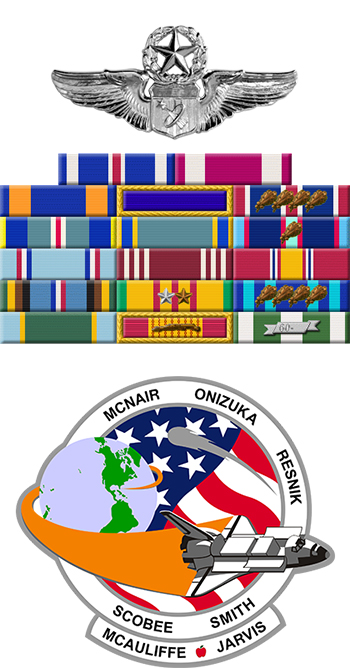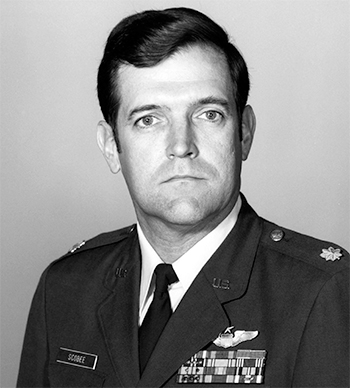
|
Francis R. "Dick" Scobee |
 |
|||
| Rank, Service | ||||
Lieutenant Colonel O-5, U.S. Air Force |
||||
| Veteran of: | ||||
|
||||
| Tribute: | ||||
Dick Scobee was born on May 19, 1939, in Cle Elum, Washington. He enlisted in the U.S. Air Force on October 3, 1957, and completed basic training at Lackland AFB, Texas, in November 1957. Airman Scobee next attended Reciprocal Engine Mechanic School at Sheppard AFB, Texas, from November 1957 to March 1958, followed by service as a C-124 Globemaster II Reciprocating Engine Mechanic with the 19th Logistic Support Squadron at Kelly AFB, Texas, from April 1958 to June 1963. He received an assignment through the Airman's Education and Commissioning Program to complete his Bachelor's Degree in Aerospace Engineering at the University of Arizona from June 1963 to July 1965 and then attended Officer Training School at Lackland AFB from July 1965 until his was commissioned a 2d Lt in the U.S. Air Force on September 28, 1965. Lt Scobee next attended Undergraduate Pilot Training at Moody AFB, Georgia, from October 1965 to October 1966, followed by C-141 Starlifter aircraft training from October 1966 to January 1967. He served as a C-141 pilot with the 76th Military Airlift Squadron at Charleston AFB, South Carolina, from January 1967 to April 1968, and then as a C-7 Caribou pilot with the 535th Tactical Airlift Squadron at Vung Tau Army Airfield, South Vietnam, from April 1968 to April 1969. Capt Scobee's next assignment was as a C-141 pilot with the 76th Military Airlift Squadron at Charleston AFB from May 1969 to February 1970, followed by service as a C-141 and then C-5 Galaxy pilot with the 3rd Military Airlift Squadron at Charleston AFB from February 1970 to July 1971. He flew 174 combat missions in Southeast Asia between his tour of duty and temporary duty flights in and out of the theater between June 1969 and October 1970. He attended Aerospace Research Pilot School at Edwards AFB, California, from July 1971 to June 1972, and then served as a Test Pilot with the Office of Advanced Manned Vehicles, 6510th Test Wing, at Edwards AFB from June 1972 to May 1978. During this time, Major Scobee served as project manager for the Space Shuttle and E-4A Advanced Airborne Command Post programs, as well as serving as pilot of NASA's Boeing 747 Shuttle Carrier Aircraft. He was selected as an Astronaut Candidate with NASA in January 1978, and completed Astronaut Training in August 1979. He retired from the U.S. Air Force as a Major with Senior Pilot Wings on January 1, 1980, and then continued serving as an Astronaut with NASA. Dick Scobee's first space flight was as pilot of the Space Shuttle Challenger (OV-099) during STS-41C from April 6 to 13, 1984. His final space flight was as Spacecraft Commander of the Space Shuttle Challenger during STS-51L on January 28, 1986, and was killed when the Space Shuttle Challenger exploded 1 minute and 13 seconds after liftoff from Cape Canaveral, Florida. His remains were recovered from the crew capsule and he was buried with the other astronauts that died on the flight at Arlington National Cemetery on May 20, 1986. He was posthumously promoted to Lieutenant Colonel, awarded Command Pilot Astronaut Wings, and awarded the Congressional Space Medal of Honor. |
||||
|
||||

